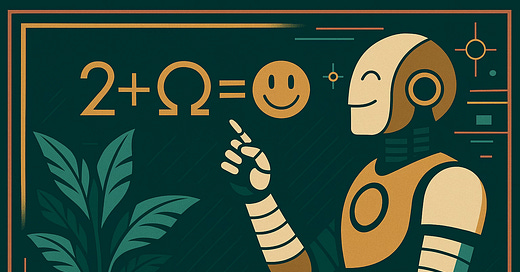AI Hallucinations, Perfectionism, and Why Nuance Is So Necessary
Quick thoughts on the on-going debate about AI hallucinations
I keep seeing posts everywhere about AI hallucinating and suddenly everyone’s pretending they’ve never once misremembered a birthday, a quote, where they parked or shared news from The Onion thinking it was real.
We’ve romanticized AI as our flawless productivity savior and now we’re shocked it occasionally makes up facts. But maybe the problem isn’t AI hallucinating.
Maybe it’s that we expect it not to, and forget to think for ourselves.
(Disclaimer: Of course, not all hallucinations are harmless. Some are frustrating. Some are biased. Some can spread misinformation or cause real harm, especially when we rely on AI for sensitive tasks without oversight. That deserves attention. That deserves critique.)
But blaming AI alone misses the point. This isn’t just about flaws in the system. It’s about our relationship to it and with ourselves.
How we trust, delegate, and think alongside it.
Here are my thoughts:
Hallucinations are Not Useless
Hallucinations are creative but very confident misfires.
They’re not ideal, but they’re also not evil.
Some of the most interesting ideas I’ve had were sparked by something that wasn’t “correct,” but was close enough to spark something new. While bouncing off of ideas back and forth, and in between raising eyebrows: I questioned, I checked, I found a new concept and way to approach a problem.
Question the Perfectionist Fallacy
If you expect AI to always be right, you’re already using it wrong. It’s not a moral failing if your LLM doesn’t cite every source like it’s writing a dissertation.
Expecting perfection means you’re trying to replace thought.
Using AI for exploration means you’re trying to expand those thoughts.
Guess which one actually leads somewhere?
And Yet, Reliability Matters
That said, yes, reliability is important. In some applications, it’s non-negotiable.
But over-reliance on any system, especially one that’s probabilistic at its core, will always backfire.
Not because the tool is bad, but because we outsourced our critical thinking.
It’s not about perfection or failure. It’s about the relationship we build with the system.
Gut Instinct & Expertise are skills to hold onto
AI can do a lot. But it still doesn’t know when your gut says “hmm, I’ve seen this before and it might be wrong.”
Sometimes your gut is your internal pattern-matcher flagging a mismatch.
Other times it’s your domain expertise nudging you to dig deeper.
That reflex to pause, question, or reframe? That’s critical thinking and it’s the difference between collaboration and blind delegation. You don’t have to accept every answer. You can question. You can adjust. You can change your mind. But yes, that actually includes work.
The Irony in the Boomer Doomer debate
I find it hilarious that people complain AI is too dumb and too powerful at the same time.
On one side: “These systems hallucinate, they’re useless.”
On the other: “They’re going to steal all our jobs and become our corporate overlords.”
While neither scenario is fully off the table, maybe the real issue isn’t AI at all.
Maybe it’s our relationship to systems.
Our addiction to speed.
Our discomfort with ambiguity.
And maybe we should focus more on the interface between human judgment and machine output.
So What if…
What if we saw this moment not as a death sentence, but a design challenge?
A chance to rethink how we work, collaborate, build.
To stop chasing perfection, and start demanding integrity from our systems and from ourselves.
Maybe the real hallucination is that perfection was ever the goal.




